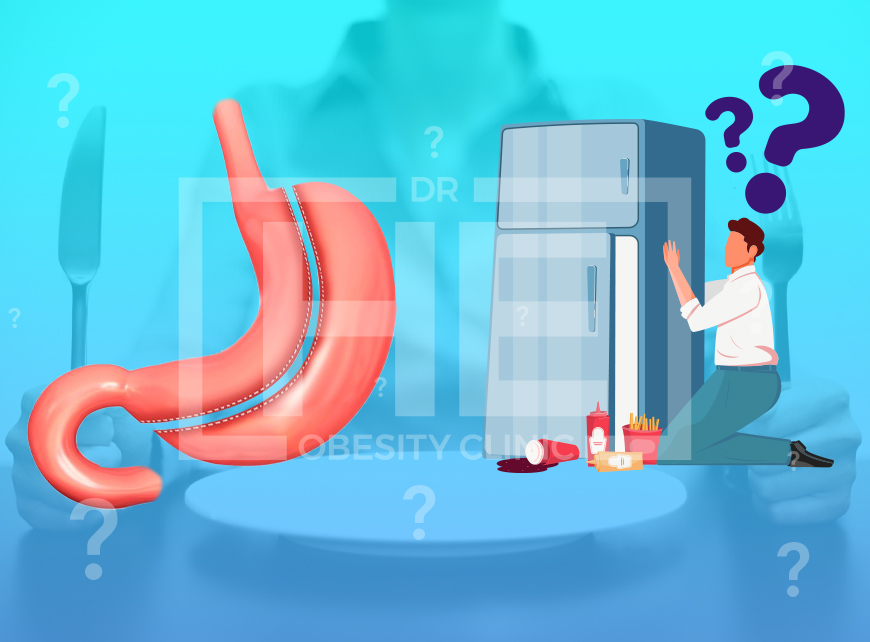
Will I Feel Hungry After Gastric Sleeve Surgery? The feeling of constant hunger is a natural feeling that conveys the body’s physiological need for substances such as calories, water, salt, protein. The way of nutrition can be influenced by factors such as appetite hormones, stress.
Although it can sometimes change normally with heavy exercise or emotional stress, feeling constantly hungry may indicate a physical or mental problem. Supporting this motive by eating constantly can also lead to the problem of obesity. There may be many criteria the causes of hunger after gastric sleeve.
A feeling of early saturation occurs with a small amount of food due to a decrease in the volume of the stomach. As a result of removing the part of the stomach (fundus) where Ghrelin, known as the appetite hormone, is secreted, the feeling of hunger is suppressed.
Since the part that releases the Ghrelin hormone, which triggers the feeling of hunger, is removed, hunger is suppressed for a long time, and you do not want much.
You should avoid insufficient food intake, especially insufficient protein intake. The goal of bariatric surgery is to lose weight by eating less and more often, not by starving. You should avoid insufficient water consumption, especially in the summer.
Here there is no such loss of absorption as with gastric bypass, but you still need to make sure that you get enough vitamins and minerals with your meals. Most importantly, you should remember that these surgeries are only the first step and an auxiliary mechanism in your fight against obesity, the main thing is that you change.
You should learn your eating habits that are healthy and suitable for you with your dietitian and try to change the habits that cause you to lose weight in the process. In the long run, your success will be determined by your change from your food choices to a healthy lifestyle.
Does the feeling of hunger disappear after surgery?
Gastric sleeve surgery is a restrictive bariatric and metabolic surgery method in which the stomach is reduced by 80 percent. Reducing the volume of the stomach with this operation allows you to lose weight at an effective level.
Since about two-thirds of the stomach is removed by surgical methods, the amount of food that a person can eat at each meal is reduced. Then nutrition and exercise habits are planned. In addition, ghrelin hormone levels secreted from the upper part of the stomach, called the fundus, are also controlled to reduce the feeling of appetite.
With gastric sleeve surgery, the wide side of the stomach is removed, that is, the part where the hunger hormone is secreted. For this reason, the patient does not feel the feeling of hunger as before, he does not need to enter the psychology of diet and force himself.
In this operation, there is no damage, changes in the functions of the stomach, only its volume decreases. From this point of view, the patient can eat from each food group in small portions at the end of the operation.
This operation is not only about the reduction of the stomach. The feature of this operation, known as stomach reduction surgery, is hidden in this detail.
Due to the structure of the stomach, only the reduction of the stomach will have a temporary effect. But with this surgery, the hunger hormone secreted from the stomach will also be severely reduced. With a decrease in the feeling of hunger, insulin resistance will also be broken.
Since the feeling of hunger decreases in this way, the effect of this operation will also be largely valid. In addition, the small incision scars left after the operation will also become completely invisible within a few months.
Are You Less Hungry After Gastric Sleeve Surgery?
The first thing you might ask after having gastric sleeve surgery is, “Are you less hungry after the procedure?”. This is because the surgery permanently reduces the size of your stomach. The procedure, known as a gastric sleeve, helps you lose weight by reducing the amount of ghrelin, the “hunger hormone.”
However, some patients do experience prolonged periods of not being hungry after the operation. While this does not happen to everyone, it is a side effect that should be managed carefully.
One of the ways to cope with your new eating habits is to eat smaller, more frequent meals. Eating more often may help you control cravings and curb your hunger.
It does not mean that you should skip meals, but it will help you avoid feeling hungry between meals. Small, frequent meals are also great for helping you lose weight. Eat five small meals throughout the day, and never skip a meal.
One of the most difficult parts of gastric sleeve surgery is overcoming old habits that led to weight gain in the first place. This is why you should look inside yourself and discover what caused you to gain weight in the first place.
Once you know this, you can develop strategies to overcome it. By being more aware of these habits, you will be able to better manage your hunger levels and stick to your diet plan.





